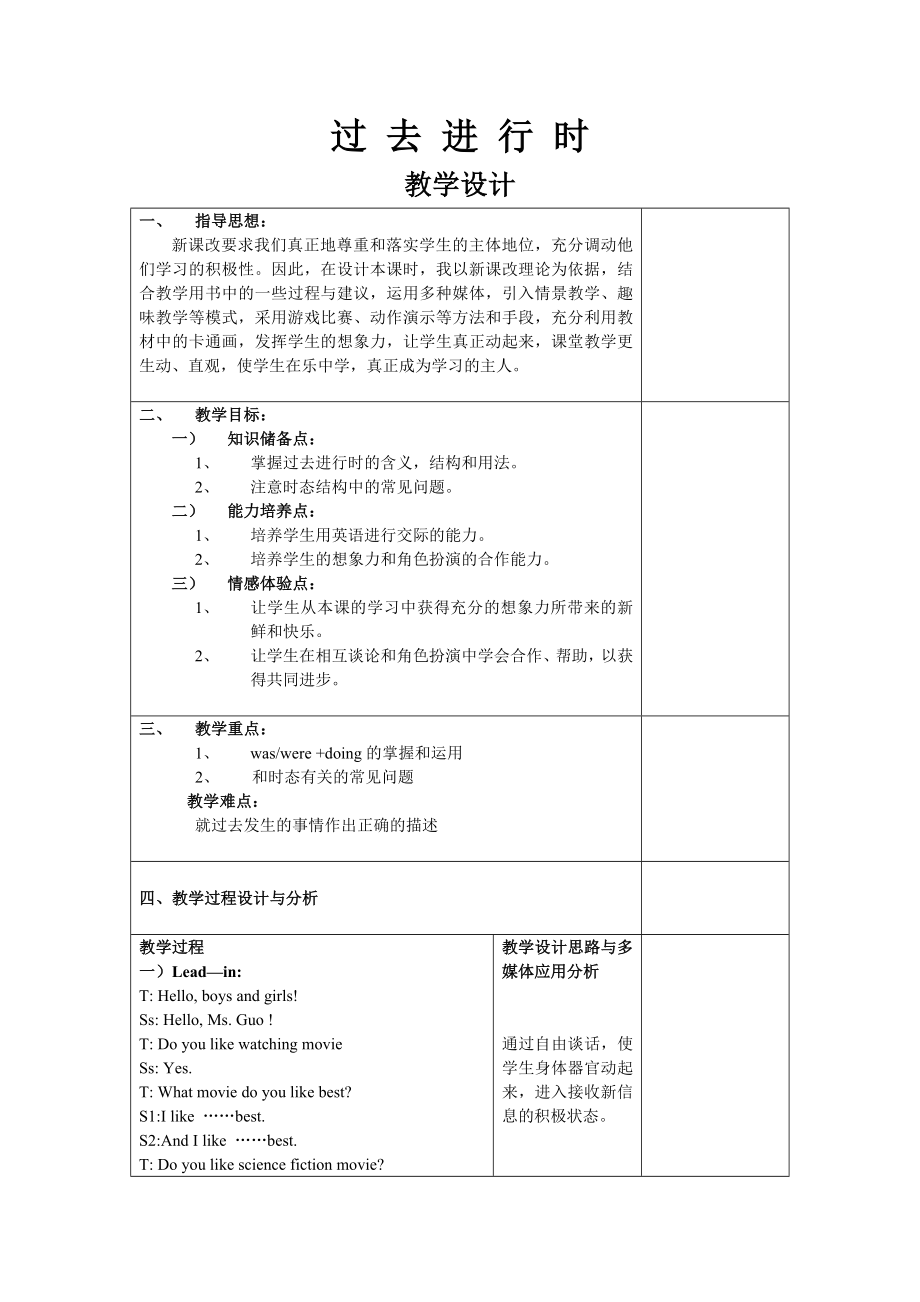《過去進(jìn)行時(shí)英語(yǔ)教學(xué)設(shè)計(jì)》由會(huì)員分享�����,可在線閱讀,更多相關(guān)《過去進(jìn)行時(shí)英語(yǔ)教學(xué)設(shè)計(jì)(4頁(yè)珍藏版)》請(qǐng)?jiān)谘b配圖網(wǎng)上搜索�����。
1�����、過 去 進(jìn) 行 時(shí)
教學(xué)設(shè)計(jì)
一�����、 指導(dǎo)思想:
新課改要求我們真正地尊重和落實(shí)學(xué)生的主體地位�����,充分調(diào)動(dòng)他們學(xué)習(xí)的積極性�����。因此�����,在設(shè)計(jì)本課時(shí),我以新課改理論為依據(jù)�����,結(jié)合教學(xué)用書中的一些過程與建議�����,運(yùn)用多種媒體�����,引入情景教學(xué)�����、趣味教學(xué)等模式�����,采用游戲比賽�����、動(dòng)作演示等方法和手段�����,充分利用教材中的卡通畫�����,發(fā)揮學(xué)生的想象力�����,讓學(xué)生真正動(dòng)起來(lái)�����,課堂教學(xué)更生動(dòng)�����、直觀�����,使學(xué)生在樂中學(xué)�����,真正成為學(xué)習(xí)的主人。
二�����、 教學(xué)目標(biāo):
一) 知識(shí)儲(chǔ)備點(diǎn):
1�����、 掌握過去進(jìn)行時(shí)的含義�����,結(jié)構(gòu)和用法�����。
2�����、 注意時(shí)態(tài)結(jié)構(gòu)中的常見問題�����。
二) 能力培養(yǎng)點(diǎn):
1�����、 培養(yǎng)學(xué)生用英語(yǔ)進(jìn)行交際的能力。
2�����、
2�����、培養(yǎng)學(xué)生的想象力和角色扮演的合作能力�����。
三) 情感體驗(yàn)點(diǎn):
1�����、 讓學(xué)生從本課的學(xué)習(xí)中獲得充分的想象力所帶來(lái)的新鮮和快樂�����。
2、 讓學(xué)生在相互談?wù)摵徒巧缪葜袑W(xué)會(huì)合作�����、幫助�����,以獲得共同進(jìn)步�����。
三、 教學(xué)重點(diǎn):
1�����、 was/were +doing的掌握和運(yùn)用
2、 和時(shí)態(tài)有關(guān)的常見問題
教學(xué)難點(diǎn):
就過去發(fā)生的事情作出正確的描述
四�����、教學(xué)過程設(shè)計(jì)與分析
教學(xué)過程
一)Lead—in:
T: Hello, boys and girls!
Ss: Hello, Ms. Guo !
3�����、
T: Do you like watching movie
Ss: Yes.
T: What movie do you like best?
S1:I like ……best.
S2:And I like ……best.
T: Do you like science fiction movie?
Ss: Yes.
T: Do you want to watch it?
Ss: Yes.
T: Ok. Please look at the screen!
[Play the video]
T: Do you like it?
Ss: Yes.
T: What’s
4�����、 that, do you know?
You may speak in Chinese.
Ss:外星人
T: Does it come from the earth?
Ss: No.
T: Yeah, it comes from another planet.
It is called “alien”
T: How did it arrive?
Ss:……
T: Yeah, it arrived by UFO.
Ok. This class we’ll learn 過去進(jìn)行時(shí)
[What were you doing when ……]
二) Present
5�����、ation:
1.T: Look at the screen and watch the flash.
[Play the flash]
T: When did the UFO arrive ?
Ss: It arrived on the morning of March 21, 2006.
T: Yeah, let’s see what different people were doing
when the UFO arrived.
T: Look! Where was the boy?
S1: He was in his bedroom.
T: What was t
6�����、he boy doing when the UFO arrived?
S2The boy was sleeping late when the UFO arrived.
T: Where was the woman?
S3:She was in the kitchen.
T: What was the woman doing when the UFO arrived?
S4:She was cooking dinner when the UFO arrived.
……
2. Watch the flash again and talk about them in anoth
7、er way.
T: What happened while the boy was sleeping late?
S1:While the boy was sleeping late, the UFO arrived.
T: And what happened while the woman was cooking dinner?
S2:While the woman was cooking dinner, the UFO arrived.
……
三) Practice:
1�����、Free talk:
T: As we know, last week our school
8�����、 held a sports meeting. Do you remember?
Ss: Yes.
T: Who won?
Ss: Our class.
T: Congratulations. Now look at the
screen, let’s talk about it.
[Show some photos ]
T: Who’s that?
Ss: It’s Liu Jianyong.
T: What was he doing?
Ss: He was running.
……
2�����、Groupwork:
Look and talk about what pe
9、ople were doing
when the UFO took off. [Show the cartoon]
S1:What was the boy doing when the UFO took off?
S2: The boy was riding his bike when the UFO took off.
S3: While the boy was riding his bike, the UFO took off.
……
3、Play games:
1) Two students act, then three students ask and answer
10�����、.
The following are needed :
was\were + doing
when\while
2) Guess who and what he\she was doing , the first
one to win will get a small gift.
[Play the videos about some famous actors]
T: Who’s that ?
S1: It’s ……
T: What was he\she doing?
S1: He\she was doing……
教學(xué)
11�����、設(shè)計(jì)思路與多媒體應(yīng)用分析
通過自由談話,使學(xué)生身體器官動(dòng)起來(lái)�����,進(jìn)入接收新信息的積極狀態(tài)�����。
放映一段影片�����,既激發(fā)了學(xué)生濃厚的學(xué)習(xí)興趣和強(qiáng)烈的求知欲望,又為下面的學(xué)習(xí)奠定了良好的基礎(chǔ)�����。
放映動(dòng)畫�����,展示不同人在不同地點(diǎn)做不同的事情�����,直觀�����、形象地學(xué)習(xí)幾個(gè)表地點(diǎn)的生詞�����,并通過對(duì)話巧妙地引入was\were + doing 這一結(jié)構(gòu)�����。
先與優(yōu)生對(duì)話�����,然后進(jìn)行的操練和反饋由優(yōu)向中、差生依次帶動(dòng)�����,使不同層次的學(xué)生均有所收獲�����。
再次看剛才動(dòng)畫�����,用另一種方式談?wù)搫偛旁掝}�����,呈現(xiàn)while 與when引導(dǎo)的時(shí)間狀
12�����、語(yǔ)從句在使用上的區(qū)別�����。同時(shí)進(jìn)行相同的操練(由優(yōu)——中、差)
展示上周運(yùn)動(dòng)會(huì)的圖片�����,在活躍的課堂氣氛中,對(duì)本課重點(diǎn)was\were + doing進(jìn)行連鎖操練�����。
展示卡通畫�����,使學(xué)生在濃厚的興趣中對(duì)when \while這一重點(diǎn)進(jìn)行連鎖操練�����。
通過做游戲,培養(yǎng)學(xué)生用英語(yǔ)交際的能力�����,對(duì)本課重點(diǎn)進(jìn)行輸出�����。
放映一些電影明星的片段�����,讓學(xué)生猜測(cè)演員的名字以及他們正在做什么�����,利用有獎(jiǎng).競(jìng)猜的形式�����,鼓勵(lì)學(xué)生積極參與,使課堂氣氛達(dá)到高潮�����。
出示教學(xué)目標(biāo)�����,對(duì)本課作出總結(jié),讓學(xué)生對(duì)所學(xué)知識(shí)的認(rèn)識(shí)得到升華�����。
 過去進(jìn)行時(shí)英語(yǔ)教學(xué)設(shè)計(jì)
過去進(jìn)行時(shí)英語(yǔ)教學(xué)設(shè)計(jì)

